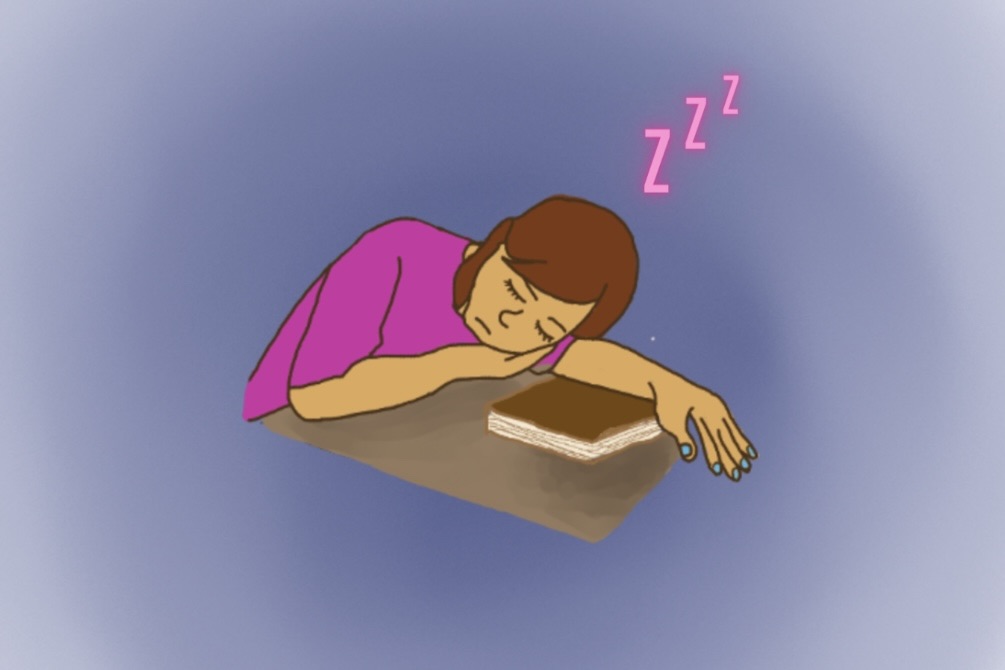Writing an article about sleep deprivation while being sleep deprived is, to say the least, quite ironic. A factor to overall health and happiness that often goes overlooked is sleep. Sleep is much more important than one may think, and it affects far more than just the amount of caffeine necessary to stay awake in math class.
According to the NIH, teens ages 13 to 18 years old should sleep eight to 10 hours per day. That would mean students would need to get into bed at 9 p.m. (assuming they need to wake up for school at least an hour before first period starts at 8:35, and they don’t fall asleep as soon as they hit the pillow). For lots of us high school students – whether because of school, sports, clubs or work – 9 p.m. is when we start our work. So, going to bed at 9 p.m. is out of the question.
It can be very difficult for students to achieve the right amount of sleep each night. Workload varies from student to student, but apart from traditional “homework,” students often have assignments that require work outside of school. This could be completing an assignment for extra credit, doing work for a school club or even writing for WSPN like I am. Whether or not a student has homework, they probably won’t be going to bed anywhere near 9 p.m.
Technology plays a big role in sleep deprivation as well. Whether it’s scrolling on TikTok for hours or waiting for your crush to text back, phone use decreases sleep significantly. Using technology late at night can be such a common habit for teenagers that most won’t hesitate to admit they have stayed up all night using their phones before. Even I’m admitting it.
“Needless to say, every teen uses phones and social media, so that is the most obvious reason [teenagers] lack sleep,” senior Juliana Perdomo said. “I find that it’s definitely the reason why I stay up for an extra hour or so. If you procrastinate and just use your phone until 8 p.m., and then realize you have a lot of homework or you have a test [the next day], you have to stay up and ruin the amount of time you could’ve gotten [to sleep].”
Several people fail to get the required amount of sleep for their bodies to function correctly. More than 30% of Americans get less than seven hours of sleep per night, and 13.5 % of adults report feeling tired most days. But how does sleep actually help us function?
Sleep doesn’t just affect our mood, it also affects the way we act and how we think. Our brains simply cannot function properly without it. Without sleep, it’s easy for students to forget things, have low energy in class and worsen their academic performance. Students need energy for their brains. They need to be well rested to stay motivated, think strategically and have quick reaction time. Memorization, focus and judgment can also all be affected by sleep. So whether a student has a sports game or a math quiz, they need sleep. In fact, a student’s body needs sleep just to perform its everyday necessities. When we sleep, our bodies are able to recharge, heal from the previous day and reset for the next.
“It’s when you’re asleep when your body repairs itself,” psychology teacher Erin Lehmann said. “That’s when your immune system gets strengthened, the toxins get flushed out of your brain, whatever you learned during the day gets cemented into your longterm memory through the process of sleeping and dreaming. It’s literally essential for your wellbeing.”
The effects of sleep deprivation aren’t a secret either. Several students come to school obviously exhausted and some can’t even stay awake in class. I have had mornings where I have to fight to keep my eyes open, and trust me, it’s a hard fight. Teachers and peers do recognize this, but most of the time, there’s not much anyone can do.
“Kids who don’t get a lot of sleep seem to have very low energy in class,” wellness teacher Amanda Rukstalis said. “Even in sports maybe they don’t play their best because they stayed up all night and they’re not well rested. I definitely see it.”
It is clear to some teachers that several students are lacking sleep and are unable to use their full potential in class, sports or other activities. Students can fail tests, get benched in games and lose opportunities to showcase their true skills because of their lack of sleep. Some teachers recognize the extent to which their class contributes to this and try to make accommodations.
“I try to tell my students that I would rather [they] email me [saying they] need to turn in homework late because [they] needed to go to bed, rather than stay up until one and then miss the whole class,” Lehmann said.
Although some understand the issue and accommodate for it, there is still more that teachers could try to enforce in order to give students the opportunity for more sleep. But first, teachers should try to understand their role in a student’s life. Even though their singular class may not be the complete cause of a students sleep deprivation, it still contributes to a student’s day. The combination of numerous classes plus the possibility of multiple extracurricular activities can make students’ lives stressful and overwhelming, and will almost certainly affect their sleep.
“From a teacher’s perspective, maybe we could do more to give a little bit less homework or maybe not have as many tests on the same day, and that would help students [to get] more sleep,” Rukstalis said.
So, is it possible to get enough sleep? I’d say not really, but there are tips that experts recommend to increase a person’s chances of getting more sleep. If you have trouble actually falling asleep or suffer from insomnia, you can try things such as sleeping in a colder temperature room, sleeping in a darker room, not eating before bed, increasing exercise during the day and more. Even by avoiding using your phone or reading before bed, you can improve your sleep naturally. As for the lack of time some students have for sleep, the best recommendation is to start saying “no” to things you otherwise would do. For example, tell your boss that you can’t work until 9 p.m. or don’t take as many Advanced Placement (AP) or honors classes that keep you up studying all night. Even if it means emailing a teacher to ask for an extension, students should realize that asking for help, whether it’s for more time or less activities, is okay.
“I think a lot of times, the tendency for people is to just join things and sign up for things, and they don’t stop to think about what that’s going to mean in terms of their time,” Lehmann said. “It’s worth it to [make] a commitment to [sleep] and make sleep a priority.”
From a student’s perspective, sleep is much more difficult to get than it seems. I don’t like to believe anything is impossible, but I would advocate that there are some situations where students have days or weeks when they physically can’t get the amount of sleep they need. The fact that a lot of students have experienced this raises an important question of what we value and what we prioritze. Is health – mental and physical – more or less important than school, sports or work?
The sad truth is that for most students, sleep is inconsequential. We are taught through social norms that to be the best athlete, employee, student or simply a human, we have to devalue our wellbeing to seem more valuable. We want to seem like our best selves, which can make us feel like our worst selves. This might not be the case for everyone, but if you look around you might realize that it’s not just you who constantly feels tired. Unfortunately, we all have to participate in the hard parts in life as well as the good parts, and losing sleep is sometimes just a part of life. But as much as we can, we should try to prevent stressful schedules and overloads of work to dominate our minds and bodies.
Although many people are beginning to recognize and acknowledge the effect that sleep deprivation has on young people, the issue still remains. The best thing that you can do for yourself is try your best to prioritize your sleep and make room for the things in your life that you need. Even if it’s not every night, try to give yourself a few more hours of sleep and you might feel a refreshing difference.
“Make choices to allow for more time in the day, and make sleep non negotiable.” Lehmann said.





![Last Wednesday, the Wayland School Committee gathered to discuss a number of topics regarding the health curriculum and Innovation Career Pathway course. Another large topic of conversation was the ways to potentially mitigate distracting cell phone usage. "These [phones] are going to distract your learning and social relationships," Superintendent David Fleishman said. "That's concrete right there."](https://waylandstudentpress.com/wp-content/uploads/2025/06/Screenshot-2025-06-04-at-9.49.31 PM-1200x886.png)



























![Troy Hoyt finishes the Boston Marathon, running for the Hoyt Foundation. T. Hoyt is the son of Hoyt Foundation CEO Russ Hoyt.
“[Running a marathon] might seem like a big thing, when it’s presented to you at first, but if you break it up and just keep telling yourself, “Yes, you can,” you can start chipping away at it. And before you know it, you’ll be running the whole 26 miles, and you won’t even think twice about it.” T. Hoyt said.](https://waylandstudentpress.com/wp-content/uploads/2025/04/C36E8761-1CBB-452E-9DF2-543EF7B1095E_1_105_c.jpeg)













































